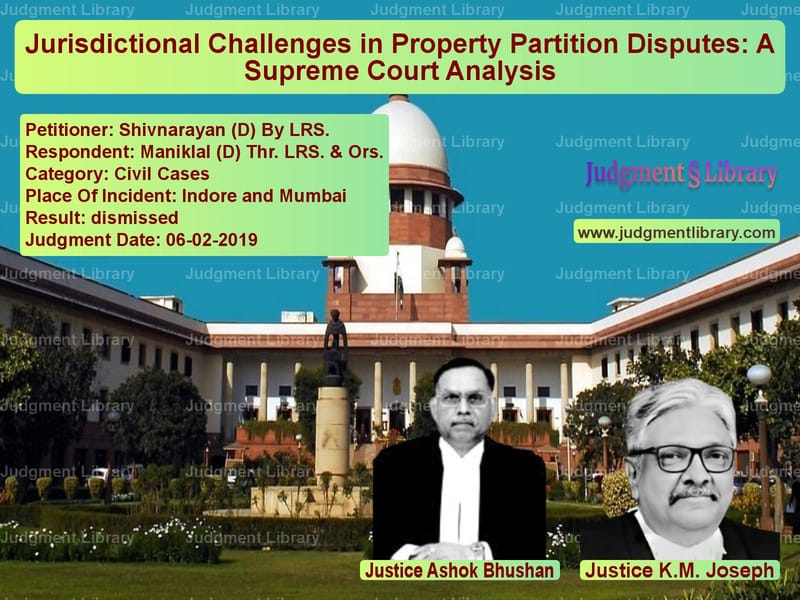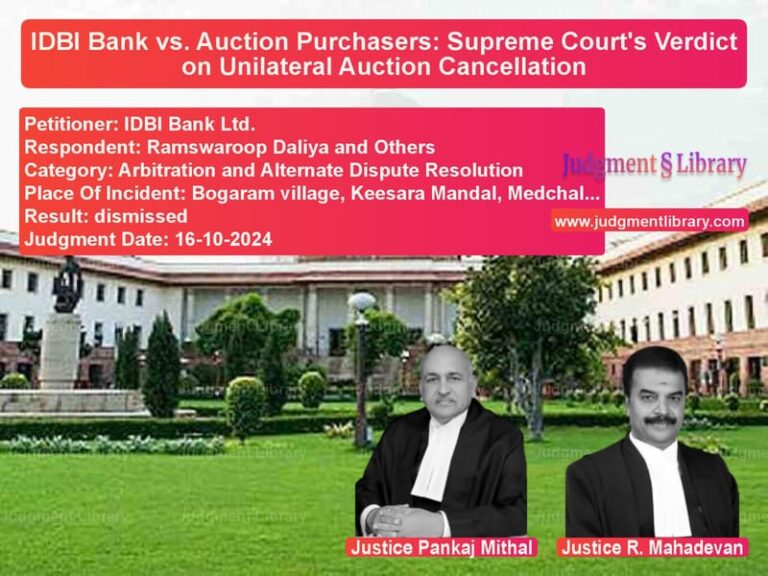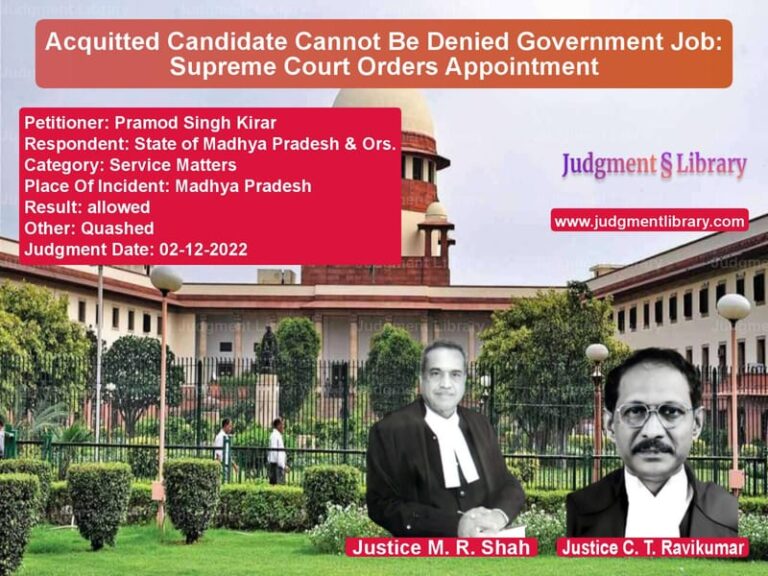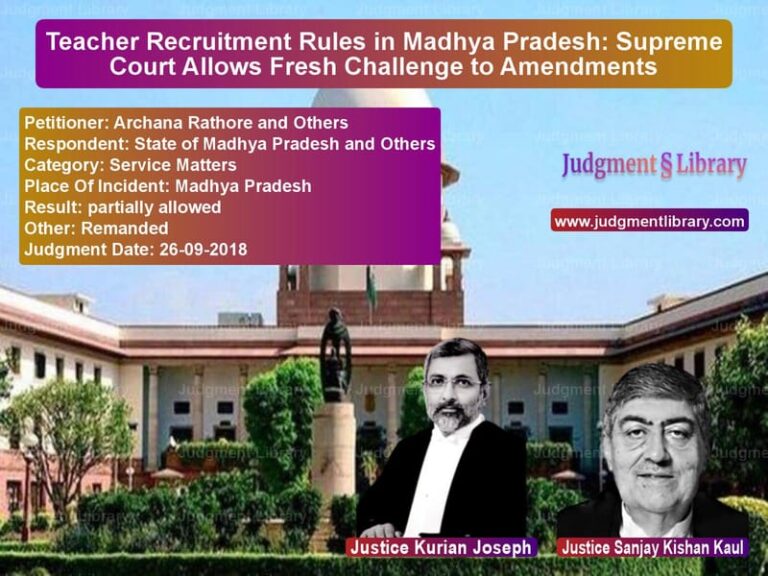Jurisdictional Challenges in Property Partition Disputes: A Supreme Court Analysis
The case of Shivnarayan (D) By LRS. vs. Maniklal (D) Thr. LRS. & Ors. presented a fundamental question regarding jurisdiction in civil disputes concerning immovable property. The Supreme Court was called upon to decide whether a suit seeking partition of properties situated in different states could be entertained by a single court. This judgment provides a crucial interpretation of Section 17 of the Civil Procedure Code (CPC) and its applicability in cases involving properties located in multiple jurisdictions.
The appellant, Shivnarayan, filed a suit challenging property transactions concerning two properties—one in Indore, Madhya Pradesh, and the other in Mumbai, Maharashtra. The claim was that both properties were part of a Hindu Undivided Family (HUF) and should be considered joint family property. The trial court struck down the suit concerning the Mumbai property, ruling that separate legal claims required separate suits. The High Court upheld this decision, leading the appellant to approach the Supreme Court.
Legal Background and Petitioner’s Claims
The petitioner argued that both properties had been acquired by his father and, following his demise, should be treated as joint family property. He contended that under Order II Rule 2 of the CPC, all claims arising from a single cause of action should be included in one suit. According to him, denying jurisdiction over the Mumbai property would force him to initiate multiple legal proceedings, potentially leading to conflicting decisions. He further argued that Section 17 of the CPC, which allows a suit to be filed in any court where a portion of the property is located, justified hearing the matter in Indore.
The petitioner’s key arguments included:
- The Indore and Mumbai properties were acquired under the same lineage and should be treated as a single entity.
- The trial court erred in striking out the portion concerning the Mumbai property as it violated the principles of res judicata.
- The case was primarily about the partition of HUF property, making it indivisible.
- Allowing separate suits would create procedural hardships and inefficiencies.
Respondent’s Arguments
The respondents, on the other hand, refuted these claims, stating that:
- The properties were acquired through different transactions and had distinct ownership histories.
- The Mumbai property was allotted to Babulal (one of the family members) independently and was later transferred legally to other parties.
- The transaction concerning the Mumbai property did not involve the Indore defendants, making their joinder improper.
- The suit suffered from mis-joinder of causes of action and was therefore not maintainable.
They emphasized that the Civil Procedure Code does not permit unrelated claims with different parties and transactions to be merged into a single suit. Furthermore, jurisdiction over immovable property is territorial, meaning that a court cannot adjudicate on property disputes beyond its geographical limits.
Key Observations by the Supreme Court
The Supreme Court undertook a detailed examination of Section 17 CPC, which states:
“Where a suit is to obtain relief respecting, or compensation for wrong to, immovable property situated within the jurisdiction of different courts, the suit may be instituted in any court within the local limits of whose jurisdiction any portion of the property is situated.”
However, the court clarified that this provision applies only when the properties form part of a single transaction or cause of action. In the present case, the two properties were acquired separately and through independent transactions. Therefore, the principle of common cause of action did not apply.
The Supreme Court’s Key Rulings:
- Jurisdiction must be determined based on the nature of the claim. If separate transactions are involved, each must be litigated in its respective jurisdiction.
- The word “property” in Section 17 CPC must be interpreted in a manner that ensures judicial efficiency while preventing unnecessary litigation. However, it cannot be stretched to accommodate unrelated claims.
- Section 16 CPC mandates that suits concerning immovable property be filed where the property is situated unless an exception applies.
- Allowing a single suit for multiple properties in different states would lead to forum shopping and procedural chaos.
Final Judgment
The court ruled against the petitioner and upheld the High Court’s order. It concluded:
“The appellant’s claim that both properties should be adjudicated in a single suit is legally untenable. The distinct nature of ownership and transaction history necessitates separate suits in the respective jurisdictions. The High Court was correct in dismissing the writ petition.”
Thus, the appeal was dismissed, and the lower court’s ruling was affirmed.
Implications of the Judgment
This ruling has profound implications for property law and civil procedure in India. Some key takeaways include:
- Clarification of Section 17 CPC: The judgment restricts the scope of Section 17 to cases where a single cause of action exists for multiple properties.
- Strengthening territorial jurisdiction: The ruling reinforces that property disputes must be litigated in the courts where the property is located.
- Preventing procedural misuse: By disallowing unrelated claims in a single suit, the court has ensured that parties cannot manipulate jurisdictional rules for convenience.
- Impact on joint family property disputes: The case serves as a precedent in determining how joint family property disputes should be handled when properties are located in different states.
In conclusion, this judgment provides crucial guidance on jurisdictional principles in property disputes, ensuring that legal claims are handled efficiently and in the appropriate forums.
Petitioner Name: Shivnarayan (D) By LRS..Respondent Name: Maniklal (D) Thr. LRS. & Ors..Judgment By: Justice Ashok Bhushan, Justice K.M. Joseph.Place Of Incident: Indore and Mumbai.Judgment Date: 06-02-2019.
Don’t miss out on the full details! Download the complete judgment in PDF format below and gain valuable insights instantly!
Download Judgment: Shivnarayan (D) By L vs Maniklal (D) Thr. LR Supreme Court of India Judgment Dated 06-02-2019.pdf
Direct Downlaod Judgment: Direct downlaod this Judgment
See all petitions in Property Disputes
See all petitions in Contract Disputes
See all petitions in Judgment by Ashok Bhushan
See all petitions in Judgment by K.M. Joseph
See all petitions in dismissed
See all petitions in supreme court of India judgments February 2019
See all petitions in 2019 judgments
See all posts in Civil Cases Category
See all allowed petitions in Civil Cases Category
See all Dismissed petitions in Civil Cases Category
See all partially allowed petitions in Civil Cases Category







